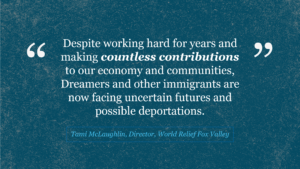Ever since the Supreme Court ruled in June that the Trump administration could not constitutionally end Deferred Action for Childhood Arrivals (DACA), reports have circulated that the administration will search for a different way to do so — and with new rules limiting who is eligible to apply for DACA, those reports have proven true. It’s clear we still need congressional action to provide a permanent solution for the Dreamers, whose contributions are vital in Wisconsin and beyond.
Since 2012, DACA has provided a pathway to citizenship for children and young adults, known as “Dreamers,” who came to the United States with their parents as minors. DACA protections allow these Dreamers to work lawfully and to be protected from deportation. Every DACA recipient has two things in common: They arrived in the United States prior to turning sixteen and they have lived here at least since 2007.This means that most DACA recipients have spent the majority of their lives in the United States. Therefore, this is the only country they know as home.
I did not realize I knew a Dreamer until a coworker of mine shared her story. My coworker arrived in the United States as a young child. When her mother applied for residency, the lawyer forgot to attach my coworker’s paperwork to the application so she lost her immigration status. Thankfully, DACA has allowed her to work, further her education (she is currently a graduate student at the University Of Chicago School Of Business), and if allowed to stay in the country, develop an already-robust career that will allow her to give back to the country that welcomed her.
If you’re a fellow Wisconsinite, its likely you know a Dreamer, too. More than 10,000 are among our neighbors. Annually, they represent more than $182 million in spending power and pay more than $23 million in state and local taxes, according to New American Economy data.

Meanwhile, around the country, 29,000 Dreamers are working as frontline medical professionals and 12,800 dreamers are working in farming and agriculture jobs, driving a crucial part of Wisconsin’s economy. Another 11,600 Dreamers work in food manufacturing. Over the next ten years, current DACA recipients will contribute an estimated $433.4 billion to our nation’s GDP and another $12.3 billion in taxes to Social Security and Medicare. These figures do not include additional contributions through state and federal taxes.
Dreamers are also our teachers, neighbors and members of our church congregations. Another friend of mine who pastors a church, herself an immigrant, confided that many of her peers and members of her congregation claim they feel like third-class citizens who have been abandoned by the government. Despite been working hard for years and making countless contributions to our economy and communities, Dreamers and other immigrants are now facing uncertain futures and possible deportations.
Wisconsinites, we are better than this. That’s why each of us must call on our legislators to act on behalf of the Dreamers in our communities. The only permanent solution for DACA recipients is for Congress to pass legislation that will allow them to become lawful permanent residents of the United States. A solution is within reach: The Dream Act, for instance, is a bipartisan bill first introduced in 2001 to allow undocumented immigrants brought to the country as minors to eventually earn citizenship if they go to college, maintain a job or serve in the U.S. military. It has been introduced in Congress repeatedly but has not yet become law.
Now, you may be asking: “What can I do?” First, if you’re a fellow Wisconsinite, send a letter to Sens. Johnson and Baldwin urging them to support the DREAM Act. We have the opportunity to secure the future of our Dreamer friends: those vital community members whom we know, and those we have not yet met.
Tami McLaughlin, director, World Relief Fox Valley (Appleton, Wisconsin)


